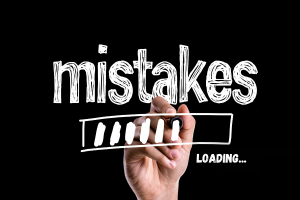Common Mistakes Entrepreneurs Make And How To Avoid Them

Let’s talk about common mistakes entrepreneurs make when they start their business. Not every entrepreneur makes these mistakes, but knowing what to avoid brings you significantly ahead of the game.
I am Sheles Wallace with Billionaire Thoughts, an ActionCOACH Partner, and in this post, we will discuss 10 common mistakes entrepreneurs make and how to avoid them in your entrepreneurial journey.
______________________________________________________________________
Here is a list of some of the common mistakes entrepreneurs make when they start their business.
1. Relying on one big customer
If you depend upon a single customer for more than 50% of a company’s revenues, your company may be headed for a meltdown. It may be easier to manage a small number of big customers, but relying on a small number of customers for most of your business will take you downhill because losing that customer can make your business broke.
2. Creating products in a marketing vacuum
Some companies put all their efforts into a product, idea, or service - only to find there are no buyers for it. It is a mistake to create a product that has to work on finding a market. It is crucial to perform market research in advance to determine whether anyone wants to buy before spending any time, money, or energy to build it.
3. Equal partnerships
Creating an equal partnership with one or more people seems fair in theory, and typically works well for a while, but in the long-run, disagreements arise and the company is in limbo because no partner has the final say. Either partner’s veto power can halt the growth and development of the company. Instead, give a managing partner ultimate control and a majority ownership stake – even if it’s only 51%. Or, grant a small percentage to a third-party advisor who will serve as the tie-breaker for the partners.
4. Low price strategy
Companies should charge the highest prices its markets will allow. Too many entrepreneurs attempt to make up for low margins with high volume, a strategy that rarely succeeds – especially for service-based companies.
5. Insufficient capitalization
Being unrealistically optimistic can inflate sales projections, shorten product development timelines, and minimize expected costs. It is important to check and recheck the business assumptions underlying the proposed venture and only proceed when capitalization can support the worst-case scenario.
6. Losing focus
Small business owners often jump at every occasion presented and lose focus on the company’s core products, services, markets, and distribution channels. Concentrating efforts in a limited area almost always produces better results than diversifying.
7. Inflating expenditures
In a quest to live a high life, entrepreneurs sometimes let expenditures inflate more than revenue. Until profits can support the costs, retain humble office space, furniture, etc. Spend any money necessary to achieve the company’s objectives, but nothing else until profits justify the expense.
8. Elusive perfection
Perfection is unattainable, but that doesn’t stop many entrepreneurs from spending a lot of money trying to achieve it. Even if the company did finally make the perfect product, the market will change and make the product obsolete. Instead, quickly bring a less-than-perfect product to market, and then another and another.
9. Low ROI
If the company cannot articulate the ROI clients will earn from its products or services, how can it expect customers to understand its value proposition? Do the analysis. If the company can demonstrate a great ROI, sales are a slam dunk.
10. Refusal to admit a mistake
The biggest mistake an entrepreneur can make is to ignore failure. If success has not come to the venture, wipe the slate clean and reassess the investment. Assume the original investment has been lost and decide from that perspective whether you can justify further investment. If not, walk away. Don’t throw good money after bad.
BONUS: Humility
Humility is a valuable personality trait for owners of small-to-medium-sized businesses, Be honest about your talents and shortcomings. Seriously consider outside advice from a competent Business Coach to bridge the gap in your experience.
About the author, Sheles Wallace
Sheles is an award-winning business coach who gets results for her clients.
For over 15 years, she has helped business owners achieve their goals and
take their businesses to the next level. If you're ready to take the next
step in your business evolution and go from an owner who wears all hats to
creating a commercial, profitable enterprise that runs without you, find out
more here: https://calendly.com/sheles/introduction?month=2021-06
